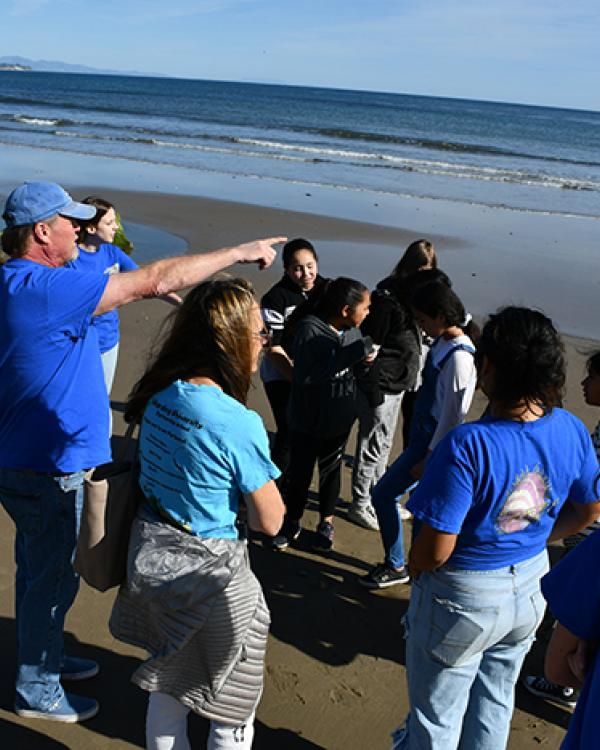
Some of the Young Authors at the UCSB REEF in February 2020 with Scott Simon
Week 6 of quarantine. Is this lifestyle actually feeling normal? Sometimes. I’m getting used to working with the kids in the morning on their schoolwork. I’m finding ways to breathe through the moments that feel oppressive. I’ve switched up my Friday routine from a dip in the ocean to a jog up the hill. I’m getting used to working from the computer in my bedroom, and more importantly the kids are getting used to not barging in.
This week, I’ve had a chance to circle back and check in on the Young Author’s Grant (YAG), a collaborative effort between Harding, UCSB REEF, and GGSE’s Community Based Literacies. The project launched at the beginning of the school year with the goal of working with 4th, 5th, and 6th graders to publish an anthology about Our Maritime Community.
My colleague, Lilly, invited me to tag along and be another set of eyes and ears to help the program coalesce. A huge undertaking, with many moving parts, YAG has faced many challenges from the outset. The schedule alone is overwhelming, coordinating 4th, 5th, and 6th grade students, classroom teachers, and UCSB graduate and undergraduate students. Not to mention the buses, required for bringing Harding students to the McEnroe Reading Clinic and UCSB Reef on Wednesday afternoons.
Despite these logistical challenges, the educators involved in this project have been determined to make this project a success. So, in the face of COVID-19, when the UCSB campus shut down, and a week later Harding shut down, rather than call it quits, a meeting was called and the group figured out how to persevere.
The classroom teachers showed up after a grueling day of tech training for distance learning. Scott Simon [from the REEF] showed up motivated to find ways to continue providing marine ecology content to the students. Diana Arya [from the McEnroe Clinic] showed up leading the charge to make sure kids still felt connected to their learning community. Valerie and Robert, GGSE graduate students, showed up prepared to take on the teaching of reading and writing with or without their team of undergraduates. Veronica, the school principal, showed up still willing and able to support the efforts while simultaneously fighting for iPads and internet connection for Harding families.
In an incredible effort to think outside of the box, the YAG team figured out how to proceed for the remainder of the year, and made a plan for completing the anthology, the component that the participants were looking forward to the most.
The first step to transitioning online was rounding up the students’ physical rough drafts. With 4th grade poems holed up in the Reading Clinic and 5th grade journalism articles trapped inside spiral notebooks, writing was on hold. After a stealthy no-touch hand-off between 5th grade teacher Jen Griffith and Valerie, followed by a masked and gloved visit to the Reading Clinic, all rough drafts were retrieved and made accessible online. Writing could continue.
But, not without another hurdle. In order to connect with the 4th, 5th and 6th graders, the UCSB faculty and students planned to meet with them via Zoom. Not as simple as you might think. Special permissions had to be requested. Finally, after several email chains, UCSB was granted access to participate. Invites were sent to students, and the weekly YAG sessions resumed via Zoom.
It would have been easy enough to write to the state library and request a COVID-19 extension, and continue the work when things return to normal. The willingness of all parties to collaborate and find solutions is exactly the kind of effort our kids and our world need to heal the social and environmental imbalances facing us today.
Devon Azzam, Gevirtz School Assistant Director of Outreach, is sheltering in place at home in Santa Barbara with partner Tarek, daughter Sophia (10) and son Dominic (7). Last day in the office 3/13, last day in the water 3/20, last day unmasked in public 4/3, last meltdown a few hours ago. Still running, gardening and listening to the trees.